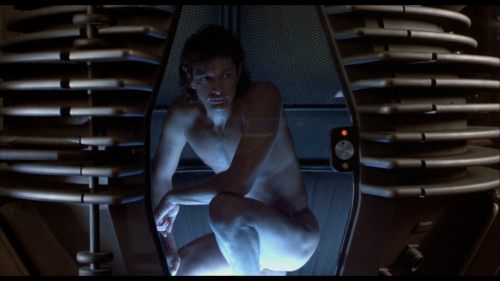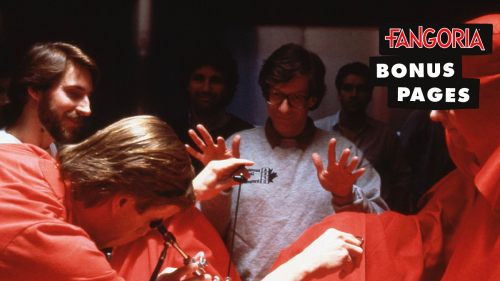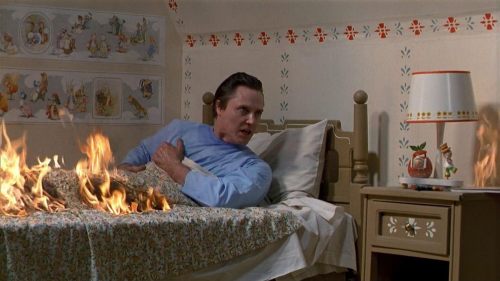David Cronenberg And The Challenges Of EXISTENZ
This Tuesday, April 23, marks the 20th anniversary of the U.S./Canadian release of David Cronenberg’s virtual-reality thriller eXistenZ. The Matrix, which opened just a month prior, may have given VR a higher-profile screen showcase, but Cronenberg, as usual, went deeper and darker. Twenty years later, eXistenZ remains one of Cronenberg’s strongest works, taking a grisly and gristle-y, body-horror approach to its hi-tech subject matter.
eXistenZ stars Jennifer Jason Leigh as a top designer of biotechnological VR games that users hook up to “bio-ports” embedded in their spines. After an assassination attempt, she goes on the run with a security guard (Jude Law) through both the real and virtual worlds—including a Chinese restaurant that hosts one of Cronenberg’s all-time most memorable setpieces. Observed in the context of the filmmaker’s body of work, eXistenZ can be seen as the capper in a thematic trilogy begun by Scanners and Videodrome—and like the latter, it got neither the release (by Dimension Films) nor the commercial reception it deserved when it first came out.
That’s something Cary Granat, president and COO of Dimension at the time, acknowledges today. “eXistenZ is one of a couple of great movies the company was involved in—in my opinion, it’s a classic—that didn’t get as much attention, but certainly deserved it. The other was Gabriele Salvatores’ film Nirvana”—also about a VR game designer, played by Christopher Lambert. “That was just brilliantly made, and not a lot of people saw it, but it’s really worth a second look.”
Part of the issue, Granat continues, had to do with the challenges of marketing a movie that didn’t fit the usual sci-fi/action paradigm. “There were some films that we figured out a strong hook for that blew up, and then there were others that probably should have had much bigger releases that I think got stuck at that point in the process. Some of them, I believe, were way too ahead of their time, and eXistenZ fell into that category, where you had a movie that was almost talking about today’s generation. If that film came out now, with e-sports and the way everyone’s living, it would be considered the testament to everything that’s happening in our modern world.
“David Cronenberg is so ahead of everybody in how he thinks; he saw that all coming. So we had a film that thematically was so far ahead of everybody else, and I would say it was one where everybody was struggling to figure out the right way to market it. But as I said, if that film was released today, it would be a massive blockbuster.”
Granat, who left Dimension in 2000 to found the more family-oriented Walden Media, and recently returned to horror with the possession drama Welcome to Mercy, recalls his collaboration with Cronenberg as a highlight of his time at the Miramax genre arm. “David was and is, obviously, a legendary filmmaker, so to have the opportunity to work with him—it was one of those situations where you’d wake up in the morning and think, how frickin’ lucky am I?” The Weinstein companies had a reputation for being, let’s say, deeply involved with their filmmakers’ creative process, but Granat recalls that Cronenberg knew how to handle it.
“We made the critical error of sending him notes and suggestions on one of the drafts of eXistenZ. And the second those went out, everybody regretted it—like, what did we just do? We just sent notes to David Cronenberg! What kind of audacity do we have to send notes to David Cronenberg? It was nothing dramatic, nothing big; it wasn’t like, ‘We need to restructure’ or anything like that. I think it was about a page and a half of general comments and suggestions, like, ‘Would you consider x, y and z?’
“And Cronenberg took the time to send back about a 14-page response, where he addressed every sentence of the notes we sent him and almost professorially took us through what he was thinking, what we understood and didn’t understand. It was the greatest document and the greatest lesson in the history of working with filmmakers, because it just showed you—it would be like someone saying, ‘I’m going to send Tolkien some notes on The Lord of the Rings.’ We loved the fact that he even took the time to do it, because a) it was so respectful, and b) it was brilliant. I’ll never forget: We all canceled our meetings that day, and we just sat around the conference room reading his letter back to us and talking about it. And then we referred to it when we were making other films, because it was such a powerful dissertation of how a director sees the filmmaking process.”



